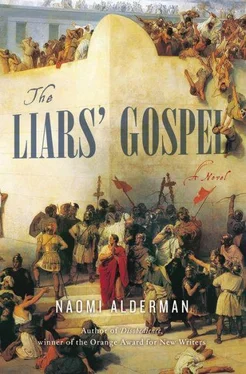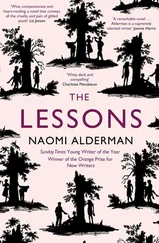So she told her sons to go to the tomb and fetch his body to take it into the hills and bury him in the ground. She thought: at least the crows will not have him. He will be buried in the same warm soil that will take my bones one day and until then I will know where he lies, and this thought was a comfort to her.
Shimon, who was always the kindest, tried to lie to her.
“We found a shady spot for him, by an olive grove,” he said, when they returned.
But when she asked him exactly where, when she asked them to take her there now so she could mark the spot in her mind, their story didn’t hold.
They had not found him. The body was gone. Taken, they supposed, by his friends to some special burial place.
Even in death they would not give him back to her. She did not want to tell her sons her worst fear — that the Romans had the body, that she would see him again on the ramparts of the walls of Jerusalem, black and bloody and gouged by beaks and rotted away.
She left Jerusalem that day and did not look to see if there were bodies on the walls, and did not ask, and told herself that her sons must be right and his friends had surely buried him in honor.
It was as if he had never been now. As if that first son had been a curious dream, leaving behind no trace. Not a plowed field, not a grieving wife, not a grandson or granddaughter. No one in the village spoke of him. Her own children had tried to forget him. It had been as if she had never borne that first son, until Gidon came to Natzaret.
He leaves as they had planned, when it is coming close to the Feast of Seven Weeks and the farmers are making their way to Jerusalem with carts filled with first fruits. He’ll be invisible among so many travelers.
She has filled him full of stories. Some have a measure of truth to them, with Yehoshuah’s childhood curiosity and his interest in learning and the way he would sometimes say things that made the adults surprised. And some are things she hoped had happened, she wished had happened. She gives him hard cheeses and bread and dried fruit so that his knapsack is bursting and she imagines another bag on his back full of the tales he’ll tell, the stories he’ll take to his friends in Jerusalem and across the nation.
“I’ll come back,” he says, “when things are less dangerous for you.”
She does not say that she is an old woman now, and does not expect to live to see the day when things are less dangerous.
She embraces him like a son, and he turns and begins to walk.
She watches him until he is out of sight. If the soldiers come back, she will say: he deceived me. He lied. A broken-hearted mother, he had no pity.
And perhaps they will listen, and perhaps they won’t. It is like the scorpion, she thinks, rubbing her right hand with her left. Once a child is born, the mother’s previous life is gone, all that matters is how she cares for the child, protects the child. Even that tiny part which is left when they are gone.
She turns. The children will be waking soon, little Iov demanding his breakfast. It is nearly the fourth hour since dawn and she has still not made bread. She goes to begin her work.
IN THE MARKETPLACE, during Passover, he hears two strangers saying that he is dead.
He is examining some clay oil lamps decorated with a blue inlay from Tarshish. At a stall nearby selling ripe melons, two women, their hair modestly covered, are discussing the rising in Jerusalem last Passover. It is not much discussed any longer, but the return of the season and the festival have brought it to mind. One woman, wearing a yellow scarf trimmed with fringes, knows more than the other. When he looks at her closely he thinks he remembers that she is the sister of the wife of one of the rabble who joined them in the last few weeks. Perhaps.
“It is sad,” she is saying, “so many of them fled. Or took on other names.” She lists several of his former friends whose faces he never expects to see again in this world. Mattisyahu the former tax collector fled south to Africa, young Yirmiyahu to Egypt, Taddai to Syria. Others she has not heard about, or has heard only vague rumors. He stops to listen. This is more news than he has had of his former friends for months.
The woman seems well informed. At one point she implies that some of her friends here in Caesarea send and receive letters from the dispersed disciples. He has heard that there are rebels here, still — Caesarea is a Roman town, the capital of the region, a waypoint for trade, so a good place for all kinds of conspiracy. But it is a mark of how little they accomplished that it is not dangerous for her to mention Yehoshuah in the market square. No one is now afraid of those who followed him.
The woman shakes her head: “There are still so many mothers who do not know what became of their sons. And Iehuda from Qeriot died, of course. He threw himself from a rocky cliff onto a field of stones. Or I heard someone else say that some of the others threw him off.” She shrugs.
“Where did you hear that?” he asks, before he has thought whether this is wise.
The women look at him curiously. He is dressed in a fine toga, his face is beardless, his hair neatly clipped. He is not a man who should pay them attention. They look modestly to the floor.
“I…” he says, “I was rather interested in the fellow at the time. Such amusing teachings.”
He has learned the lines well. They come easily to him.
The woman who was just now so full of gossip opens and closes her mouth but no sound emerges.
At last she says, “Just rumors, sir. My brother is a sailor, he tells us tales. We have no common cause with traitors against Caesar.”
Her tone is pleading.
He nods and smiles, allows his gaze to drift from them. He has no interest in scaring them.
The other woman has decided which melon she wants and buys it hurriedly. They move on, mumbling a good-bye, their eyes cast down. He wonders how many of their other snippets of news were outright lies or strange misheard half tales.
He turns the clay lamp over in his hand. He imagines throwing it to the floor, how the oil would spill forth, staining the hard earth with fragrance. It is a little time before he realizes that he is remembering the perfume bottle smashed on the ground, the room choking with its scent.
He wants to think about what he’s heard. None of what the woman said might be true, or a portion of it, but if this is the tale being told among those who knew his friends, perhaps it is time to leave his hiding place. Perhaps he should find them, tell them he is still alive, try to explain what he did.
He walks home slowly, taking the long route around, west towards the harbor. Here the boats are constantly working. Even on the Sabbath, even on the festivals, men from fifty nations load and unload cargo. There are baskets of fresh fish, figs from the orchards in the north, oil and perfume from across the ocean, bolts of expensively dyed cloth, pretty stones and jewels for women, even silver mirrors and ivory combs for those who can afford such things. Caesarea is rich.
The harbor too is one of the wonders of the world. Herod’s men slung it across the bay in seven years. They worked on the Sabbath, and in the seventh year, the year of rest. If he were still in Jerusalem, some preacher would even now be shouting to a crowd of followers that the harbor was cursed, that all who traded in it had earned God’s eternal anger. But this is not Jerusalem and the work goes on.
He wonders if this is the freedom he had sought all along. To be in a place where one could decide to care or not to care about the laws for oneself. The Romans had brought that freedom, together with their statues of their little arguing gods, and he had never noticed.
Читать дальше












